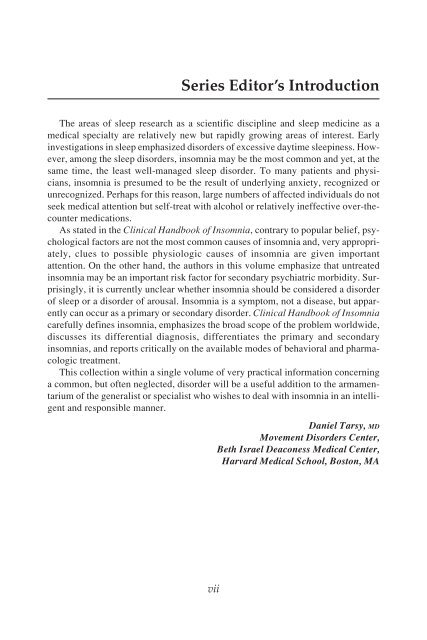Insomnia Insomnia
Insomnia Insomnia
Insomnia Insomnia
Create successful ePaper yourself
Turn your PDF publications into a flip-book with our unique Google optimized e-Paper software.
Series Editor’s Introduction<br />
The areas of sleep research as a scientific discipline and sleep medicine as a<br />
medical specialty are relatively new but rapidly growing areas of interest. Early<br />
investigations in sleep emphasized disorders of excessive daytime sleepiness. However,<br />
among the sleep disorders, insomnia may be the most common and yet, at the<br />
same time, the least well-managed sleep disorder. To many patients and physicians,<br />
insomnia is presumed to be the result of underlying anxiety, recognized or<br />
unrecognized. Perhaps for this reason, large numbers of affected individuals do not<br />
seek medical attention but self-treat with alcohol or relatively ineffective over-thecounter<br />
medications.<br />
As stated in the Clinical Handbook of <strong>Insomnia</strong>, contrary to popular belief, psychological<br />
factors are not the most common causes of insomnia and, very appropriately,<br />
clues to possible physiologic causes of insomnia are given important<br />
attention. On the other hand, the authors in this volume emphasize that untreated<br />
insomnia may be an important risk factor for secondary psychiatric morbidity. Surprisingly,<br />
it is currently unclear whether insomnia should be considered a disorder<br />
of sleep or a disorder of arousal. <strong>Insomnia</strong> is a symptom, not a disease, but apparently<br />
can occur as a primary or secondary disorder. Clinical Handbook of <strong>Insomnia</strong><br />
carefully defines insomnia, emphasizes the broad scope of the problem worldwide,<br />
discusses its differential diagnosis, differentiates the primary and secondary<br />
insomnias, and reports critically on the available modes of behavioral and pharmacologic<br />
treatment.<br />
This collection within a single volume of very practical information concerning<br />
a common, but often neglected, disorder will be a useful addition to the armamentarium<br />
of the generalist or specialist who wishes to deal with insomnia in an intelligent<br />
and responsible manner.<br />
vii<br />
Daniel Tarsy, MD<br />
Movement Disorders Center,<br />
Beth Israel Deaconess Medical Center,<br />
Harvard Medical School, Boston, MA


